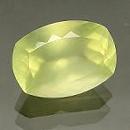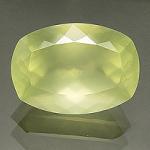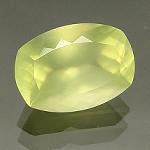|
ClassicGems.net |
|
|
 |
|
Prehnite |
|
|
Discovered in 1774; IMA status: Valid (pre-IMA; Grandfathered) |
|||
|
|
|
Chemistry |
|
|
|
|
|
Ca2Al2Si3O10(OH)2 |
|
|
|
Calcium Aluminum Silicate Hydroxide |
|
Molecular Weight: |
395.38 gm |
|
Composition: |
Calcium |
20.27 % |
Ca |
28.37 % |
CaO |
|
|
Aluminum |
13.65 % |
Al |
25.79 % |
Al2O3 |
|
|
Silicon |
21.31 % |
Si |
45.59 % |
SiO2 |
|
|
Hydrogen |
0.25 % |
H |
2.28 % |
H2O |
|
|
Oxygen |
44.51 % |
O |
|
|
|
|
|
100.00 % |
|
100.00 % |
= TOTAL OXIDE |
|
|
|
||||
|
Classification |
|
|
|
|
|
Silicates (Germanates) |
|
|
8/G.07-30 |
|
|
|
9 : SILICATES (Germanates)
|
|
Related to: |
None |
|
Members of Group: |
None |
|
Varieties: |
None |
|
Synonyms: |
Adelite (of de Fourestier), Adilite, Aedelite, Ædelite (of Walmstedt), Aedilite, Bostrichites, Chiltonite, Chrysolite (of Sage), Coupholite, Prehnitoid (of Bechi) |
|
|
|
|
Crystal Data |
|
|
|
|
|
Uncommon as crystals, tabular or prismatic to steep pyramidal, to 4.5 cm. Aggregates are fanlike, reniform, globular, stalactitic; granular, compact. |
|
|
Fine lamellar |
|
|
|
|
|
Physical Properties |
|
|
|
|
|
Good on [001], Poor on [110] |
|
|
Irregular/Uneven |
|
|
Brittle |
|
|
6.0 - 6.5 |
|
|
2.80 - 2.95 (g/cm3) |
|
|
Fluorescent; blue white or mild peach under SW UV, yellow under LW UV |
|
|
Not Radioactive |
|
|
|
|
|
Optical Properties |
|
|
|
|
|
Colorless, light to dark Green, Yellow, White, Gray |
|
|
Semitransparent to Translucent |
|
|
Vitreous to Pearly; Pearly on cleavage {001} |
|
|
1.611 - 1.665 Biaxial ( + ) |
|
|
0.0220 - 0.0330 |
|
|
Weak; r > v |
|
|
None |
|
|
|
|
|
Occurances |
|
|
|
|
|
Geological Setting: |
A secondary or hydrothermal mineral in veins and cavities in mafic volcanic rocks; less commonly in granite gneiss or syenite; a typical product of low-grade metamorphism. |
|
Common Associations: |
Zeolites, Datolite, Pectolite, Calcite, Epidote, Copper |
|
Common Impurities: |
Ti, Fe, Mg, Na, K, H2O |
|
Type Locality: |
Karoo dolerites, Craddock District, Eastern Cape Province, South Africa |
|
Year Discovered: |
Discovered in 1774; named in 1788 |
|
View mineral photos: |
|
|
|
|
|
Unusual Gem Categories |
|
|
|
|
|
|
|
|
|
|
|
More Information |
|
|
|
|
|
|
|
|
|
|
|
Prehnite is a beautiful gem with a pearly to velvety look that glows with color in well faceted gems. Most facetable material is found in Australia and Mali. The richest, most saturated colors come from Australia. Colors range from bright yellow (Australia), yellowish green, pale green (Mali) and colorless. Prehnite was named in 1788 by German geologist Abraham Gottlieb Werner (1749-1817) in honor of Dutch Colonel Hendrik von Prehn (1733-1785), who is credited with discovering the mineral in 1774 at the Cape of Good Hope in South Africa. Von Prehn was governor of Cape of Good Hope from 1779 to 1780. It has been claimed that Prehnite was the first mineral named for a person. |
|
|
Prehnite gems for sale:
|
|||||||||||||||||||||||||||

